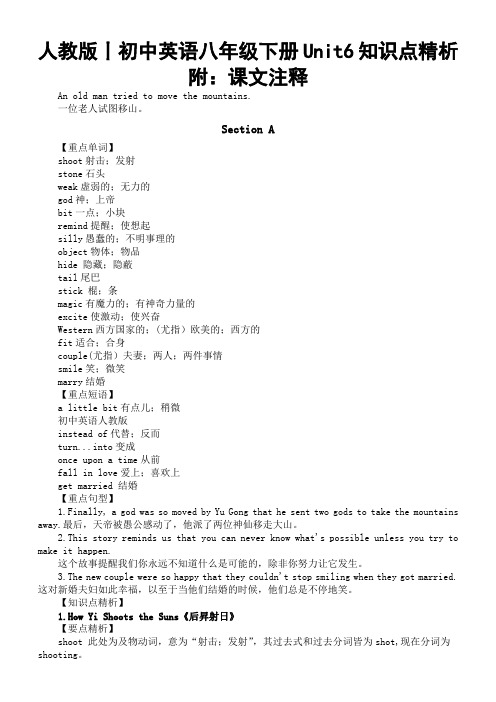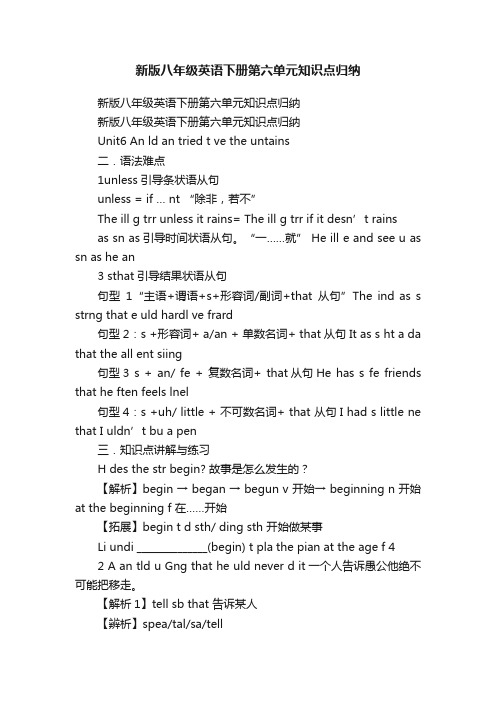初中:八年级英语下册Review of units 6-8知识讲解
Unit6知识点精析人教版八年级英语下册

人教版丨初中英语八年级下册Unit6知识点精析附:课文注释An old man tried to move the mountains.一位老人试图移山。
Section A【重点单词】shoot射击;发射stone石头weak虚弱的;无力的god神;上帝bit一点;小块remind提醒;使想起silly愚蠢的;不明事理的object物体;物品hide 隐藏;隐蔽tail尾巴stick 棍;条magic有魔力的;有神奇力量的excite使激动;使兴奋Western西方国家的;(尤指)欧美的;西方的fit适合;合身couple(尤指)夫妻;两人;两件事情smile笑;微笑marry结婚【重点短语】a little bit有点儿;稍微初中英语人教版instead of代替;反而turn...into变成once upon a time从前fall in love爱上;喜欢上get married 结婚【重点句型】1.Finally, a god was so moved by Yu Gong that he sent two gods to take the mountains away.最后,天帝被愚公感动了,他派了两位神仙移走大山。
2.This story reminds us that you can never know what's possible unless you try to make it happen.这个故事提醒我们你永远不知道什么是可能的,除非你努力让它发生。
3.The new couple were so happy that they couldn't stop smiling when they got married.这对新婚夫妇如此幸福,以至于当他们结婚的时候,他们总是不停地笑。
【知识点精析】1.How Yi Shoots the Suns《后昇射日》【要点精析】shoot 此处为及物动词,意为“射击;发射”,其过去式和过去分词皆为shot,现在分词为shooting。
外研版八年级下学期Module 6-Module 8重要知识点总结和语法点的讲解

外研版八年级下学期Module 6-Module 8重要知识点和语法点的讲解Module 6知识点1 a bit a little相同点:a bit /a little adj eg :I am a bit / a little tired .不同点:a little + n a bit of + n eg : a little water a bit of water2 have /take a look/ walk /seat /rest /shower (n )= look walk sit rest (v)Eg : have a look at the book = look at the book3 show sb sth = show sth to sb 给某人展示某物,如果宾语是代词,只能用show the to sb Eg : Please show me a book .= Please show a book to me .Please it to me .4 see sb do sth see sb doing sth 看见某人做某事、看见某人正在做某事类似的单词还有:notice hear watchEg : I often see John watch football games .I saw John playing football just now .5 make sb do sth make sb adj / n (宾语补足语) 使某人做某事、怎么样Eg :We made the little girl laugh .It makes me happy .8 run out of / run out use uprun out of = use up 主语通常是人run out 也可表示“用完,用尽”,其主语通常是时间,金钱,食物等。
Eg : I have run out of milk. We are using up the money .Eg : Time is running out . His money soon ran out .9 valuable (adj)= be of value (n) 类似的单词有important = of importanceEg : The book is valuable = The book is of value .语法专项简单句的五种基本句型语法全解英语句子由主语,谓语,宾语,表语,宾语补足语,定语或状语等组成。
八年级英语下册第六单元最全知识点总结重点句型

八年级英语下册第六单元最全知识点总结(重点句型)八年级英语下册第六单元最全知识点总结(重点句型)重点句型:1.Which hobby do youakes uace ?你认为那种爱好最占空间?2‘s a bit of a mess .不好意思,有一点乱。
3.Let me have a look .让我看一看。
4.They must be really valuable .它们一定很有价值。
bobby doesn’t cost as much as yours . 我的爱好不像你的那么值钱。
6.It came out as a book in 2012.它在2012年做为一本书出版的。
7.Hobbies can make you grow as a爱好可以让你长大成人。
8.I’ll show you my sta我将展示我的邮票给你看。
9.As well as the usual activuch as sailing and climbingwas a writing class.除了像帆船和爬山这些活动,还有写作课.【知识点精讲】Which hobby do youakes up the least space?1 / 111 / 111 / 11你认为哪种爱好占用空间最少?点拨1take up在句中意为“填满,占据(某空间或时间)”。
That big TV set takes up too much spa那个大电视太占地方。
’ully taken up with writing.吉姆的时间都用于写作了。
点拨2least是little的最高级,“最小的;最少的;最小;最少”;其比较级是less,“较少的;更少的”,在句中通常用来修饰不可数名词。
He’s the best teacher even though he has the least ex他尽管经验最少,但教得最好。
2’s a bit untidy. I’ll tidy up the table and cha对不起,有点乱。
八下u6知识点

八下u6知识点《八下 U6 知识点》八年级下册第六单元的学习内容丰富多样,涵盖了语法、词汇、阅读和写作等多个方面。
下面我们就来详细梳理一下这一单元的重要知识点。
首先是语法部分。
本单元重点学习了宾语从句和一般过去时的被动语态。
宾语从句是一个非常重要的语法点。
宾语从句在句子中充当宾语,通常跟在动词、形容词或介词之后。
要注意宾语从句的语序,要用陈述句语序,即主语在前,谓语在后。
例如:“He asked where I was from” 这里“where I was from”就是宾语从句,使用了正常的陈述句语序。
同时,宾语从句的时态要根据主句的时态来进行相应的变化。
如果主句是一般现在时,宾语从句可以根据实际情况使用各种时态;如果主句是一般过去时,宾语从句通常要用相应的过去时态,比如一般过去时、过去进行时、过去将来时或过去完成时。
一般过去时的被动语态也是本单元的重点。
其构成是“was/were +过去分词”。
例如:“The book was written by him” 这个句子中,“was written”就是一般过去时的被动语态,表示“这本书是被他写的”。
要注意被动语态强调的是动作的承受者,而不是执行者。
在词汇方面,本单元出现了许多与历史、故事相关的词汇。
比如“shoot”(射击;发射)、“stone”(石头)、“weak”(虚弱的;无力的)、“god”(神;上帝)、“remind”(提醒;使想起)等等。
对于这些词汇,不仅要掌握它们的基本含义,还要能够正确运用在句子中。
阅读部分,本单元的文章通常具有一定的故事性和文化内涵。
通过阅读这些文章,我们可以提高阅读理解能力,同时了解不同的文化和历史背景。
在阅读过程中,要注意抓住文章的主旨大意,理解关键信息,并能够根据上下文猜测生词的含义。
写作方面,基于本单元学习的内容,可能会涉及到讲述故事或者描述历史事件。
在写作时,要注意运用所学的语法和词汇,合理组织文章结构,使文章逻辑清晰、表达流畅。
新版八年级英语下册第六单元知识点归纳

新版八年级英语下册第六单元知识点归纳新版八年级英语下册第六单元知识点归纳新版八年级英语下册第六单元知识点归纳Unit6 An ld an tried t ve the untains二.语法难点1unless引导条状语从句unless = if … nt “除非,若不”The ill g trr unless it rains= The ill g trr if it desn’t rainsas sn as引导时间状语从句。
“一……就” He ill e and see u as sn as he an3 sthat引导结果状语从句句型1“主语+谓语+s+形容词/副词+that从句”The ind as s strng that e uld hardl ve frard句型2:s +形容词+ a/an + 单数名词+ that从句It as s ht a da that the all ent siing句型3 s + an/ fe + 复数名词+ that从句He has s fe friends that he ften feels lnel句型4:s +uh/ little + 不可数名词+ that 从句I had s little ne that I uldn’t bu a pen三.知识点讲解与练习H des the str begin? 故事是怎么发生的?【解析】begin → began → begun v 开始→ beginning n 开始at the beginning f 在……开始【拓展】begin t d sth/ ding sth 开始做某事Li undi ______________(begin) t pla the pian at the age f 42 A an tld u Gng that he uld never d it一个人告诉愚公他绝不可能把移走。
新人教版八年级英语下册Unit 6 知识点归纳

新人教版八年级英语下册Unit 6 知识点归纳Unit 6 An Old Man Tried to Move the MountainsOnce upon a time。
there was an old man who lived in a small village in China。
He was weak and had trouble walking。
but he had a big dream。
He wanted to move the mountains that blocked the way to his village。
The mountains were too big and too far away。
but the old man was determined to try.The villagers laughed at him and said he was crazy。
but the old man did not give up。
He worked on digging and moving the mountains every day。
little by little。
As soon as he finished one day's work。
he started again the next day。
He knew it would take a long time。
but he was XXX work.One day。
a god saw the old man's hard work and was moved by his XXX god decided to help the old man by sending two magiccreatures to move the mountains。
The old man was overjoyed and thanked the god for his help.The villagers were amazed when they saw the mountains were gone。
人教版八年级英语下册 Review of Unit 6 教学课件
excite Western
fit couple
smile
v. 使激动;使兴奋 adj. 西方国家的;(尤指)欧美的;
西方的(w可以小写)
v. 适合;合身 n.(尤指)夫妻;两人;两件事物 v. & n. 笑;微笑
marry gold silk
nobody stupid cheat
v. 结婚 n. 金子;金币 adj. 金色的 n. 丝绸;丝织物 pron. 没有人 n. 小人物 adj. 愚蠢的 v. 欺骗;蒙骗 n. 骗子
wife husband
whole shine
bright
n. 妻子;太太 n. 丈夫 adj. 全部的;整体的 v. 发光;照耀
adv. 光亮地;明亮地 adj. 明亮的;光线充足的
ground lead voice
brave
n. 地;地面 v. 带路;领路 n. 声音 adj. 勇敢的;无畏的
1. 忙于;从事 2. 一……就…… 3. 移走;搬走 4. 有点儿;稍微 5. 似乎很可能 6. 放弃
work on as soon as take away a little bit seem very possible give up
7. 代替;反而 8. 不同的观点 9. 能 10. 事实上 11. 第一次 12. 把……变成
8. — As you can see, your story _e_x_c_i_te_s__ (使兴奋) the children very much.
— I’m glad they like my story.
9. Luckily, __n_o_b_o_d_y___ (没有人) was hurt in the accident.
人教版八年级下册英语 Unit 6 知识点语法归纳总结
人教版八年级下册英语Unit 6 知识点语法归纳总结Unit 6 An old man tried to move the mountains.1.短语归纳2.典句必背3.用法集萃(1)As soon as the man finished talking, Yu Gong said that his family could continue to movethe mountains after he died. 那个男人一说完,愚公就说他死后他的家人会继续移动那些山。
❖as soon as表示“一...就...”,引导时间状语从句。
例:As soon as I went through customs, I jumped in a taxi. 我一过海关就跳上了一-辆计程车。
❖注意:在含as soon as、when等引导的时间状语从句的主从复合句中要遵循“主将从现”的原则,即主句如果用一般将来时,从句要用一般现在时。
(2)This story reminds us that you can never know what’s possible unless you try to make ithappen.这个故事起帮我们,如果你不试图使它发生,你水远都不可能知道可能发生的事情。
❖remind作动词,意为“提醒;使想起”。
常见的搭配有:(3)I think it’s a little bit silly. 我觉得那有点儿愚蠢❖ a little bit是固定搭配,意为“有点儿;稍微”,用来修饰形容词或副词。
例:Your bedroom is a little bit dirty. Please clean it up.你的卧室有点儿脏。
请把它打扫干净。
Mike checked the papers a little bit carelessly, so he failed the exam again.迈克在检查试卷的时候有点儿粗心,所以他考试又没有及格。
人教版八年级下册英语Unit 6 知识点语法归纳总结
Unit 6 An old man tried to move the mountains.1.短语归纳2.典句必背3.用法集萃(1)As soon as the man finished talking, Yu Gong said that his family could continue to move themountains after he died. 那个男人一说完,愚公就说他死后他的家人会继续移动那些山。
❖as soon as表示“一...就...”,引导时间状语从句。
例:As soon as I went through customs, I jumped in a taxi. 我一过海关就跳上了一-辆计程车。
❖注意:在含as soon as、when等引导的时间状语从句的主从复合句中要遵循“主将从现”的原则,即主句如果用一般将来时,从句要用一般现在时。
(2)This story reminds us that you can never know what’s possible unless you try to make it happen.这个故事起帮我们,如果你不试图使它发生,你水远都不可能知道可能发生的事情。
❖remind作动词,意为“提醒;使想起”。
常见的搭配有:(3)I think it’s a little bit silly. 我觉得那有点儿愚蠢❖ a little bit是固定搭配,意为“有点儿;稍微”,用来修饰形容词或副词。
例:Your bedroom is a little bit dirty. Please clean it up.你的卧室有点儿脏。
请把它打扫干净。
Mike checked the papers a little bit carelessly, so he failed the exam again.迈克在检查试卷的时候有点儿粗心,所以他考试又没有及格。
新人教版英语八年级下册 6单元知识点要点解析
新人教版英语八年级下册 6单元知识点要点解析本文档旨在对新人教版英语八年级下册第6单元的知识点进行要点解析。
1. 单词和短语- expression: 表达,表情- all of a sudden: 突然间- rise: 上升- offer: 提供,提议- after a while: 过了一会儿- realize: 意识到2. 重要句型- It was dark and I couldn't see anything.- 它很黑,我什么都看不见。
- I heard someone calling my name.- 我听到有人在叫我的名字。
- All of a sudden, a bright light appeared and the room was filled with light.- 突然间,一道亮光出现了,房间里充满了光亮。
3. 语法知识本单元主要涉及一般过去时的用法。
一般过去时用于表示过去发生的事情、存在的状态或持续的动作。
常见的一般过去时的句型结构为:主语 + 动词过去式 + 其它成分。
例如:- I watched a movie last night.- 昨晚我看了一部电影。
- He visited his grandparents during the summer vacation.- 他在暑假期间去拜访了他的祖父母。
4. 阅读理解技巧在阅读理解题中,通常需要我们掌握以下技巧:- 仔细阅读问题和文章,理解题目的要求;- 利用关键词定位相关信息;- 注意文章中的时间、地点、人物等线索,帮助理解文章的内容;- 根据问题的类型选择合适的答案;- 验证答案是否符合文章内容。
5. 拓展练建议为了提高对本单元内容的理解和应用能力,建议进行以下拓展练:- 阅读更多相关的英语文章,并做阅读理解题;- 练书面表达,用英语描述一段过去发生的事情;- 观看英语电影或纪录片,提高听力理解能力;- 参加英语角或英语交流活动,提升口语表达能力。
- 1、下载文档前请自行甄别文档内容的完整性,平台不提供额外的编辑、内容补充、找答案等附加服务。
- 2、"仅部分预览"的文档,不可在线预览部分如存在完整性等问题,可反馈申请退款(可完整预览的文档不适用该条件!)。
- 3、如文档侵犯您的权益,请联系客服反馈,我们会尽快为您处理(人工客服工作时间:9:00-18:30)。
初中英语新课程标准教材英语教案( 2019 — 2020学年度第二学期 )学校:年级:任课教师:英语教案 / 初中英语 / 八年级英语教案编订:XX文讯教育机构八年级英语下册Review of units 6-8知识讲解教材简介:本教材主要用途为通过学习英语的内容,提高学生的语言技能,增加一项语言能力,有利于国际化的日常交流、生活、工作等,本教学设计资料适用于初中八年级英语科目, 学习后学生能得到全面的发展和提高。
本内容是按照教材的内容进行的编写,可以放心修改调整或直接进行教学使用。
review of units 6---8一. 重点词汇短语1. feel like意思是“觉得好像…”,相当于feel as if/feel as though,like为介词,其后可加名词或句子做宾语。
如:when he knew he was cheated,he felt like a fool.当他得知被骗后,觉得自己像一个傻瓜。
feel like 还有“想做某事”的意思,其后要接doing形式。
如:he felt like eating something,because he was very hungry. 他想吃些东西,他太饿了。
(1)would like 的意思为“想做某事”,但是它的用法不同于feel like,后面要接to do sth.如:he would like to swim in the river. 他要去河里游泳。
(2)would love 也是同样的用法。
如:i would love to go to japan. 我想去日本。
2. answer,reply和respond(1)answer 表示“回答”的意思是普通用语,使用范围较广,指对问题、问候、请求、信件、电话等的口头或书面回答,可以用作及物或不及物动词。
如:what shall i answer? 我将怎么回答呢?i've answered his letter.我给他回信了。
she answered that she knew nothing about it.她回答说,她对此一无所知。
(2)reply 的用法比answer正式些,有时作“答复”解,其句法与answer 基本相同,但它一般用作不及物动词,后接 to sb./sth.如:i don't know what to reply. 我不知道该回答什么。
i wrote,but she did not reply. 我写了信,但她没有回信。
they replied that no one would go.他们答复说,没有一个人愿意去。
(3)respond 指对他人的要求、号召、主张等,“做出(自觉地)反应”或“响应”,它是个不及物动词,后接 to sb./ sth.如:he responded(to my suggestion)with a laugh/by laughing.他(对我的建议)以笑作答。
we quickly responded to our neighbor's appeal for help.我们很快响应了邻居的求助呼吁。
3. other,the other,another(1)other是代词,用作定语时,意思是“另外的”、“别的”、“其他的”;有单、复数两种形式。
others(=other+复数名词) 泛指“部分”含义,用于已知的一些人或物中,除去某些后余下的人或物中的一部分。
如:i'll come again some other day. 我改日再来。
they live on the other side of the street.他们住在马路的另一边。
some people came by bus,others came on foot.有些人乘公共汽车来,另一些人步行来。
those are yours and the others are mine.那些是你的,其余的是我的。
(2)the other表示“另一个”的意思,指两个人或事物中的“另一个”。
the others(=the other+复数名词)指一定范围内除去一个或一部分后,“余下的人或物的全部”。
如:the two brothers look so alike that i can’t tell one from the other.兄弟俩长得很相像,我分不清谁是谁。
i have two books,one in chinese and the other in english.我有两本书,一本是中文的,另一本是英文的。
this composition is better than the others. 这篇作文比其他那些都好。
(3)another亦表示“另一个”的意思,但它指同类人或事物不定数目中的“另一个”。
another前面不能用定冠词the,它作为定语通常与单数名词连用,它后面也可以跟few或基数词的复数名词。
如:i don’t like this.show me another,please.我不喜欢这个。
请再拿另一个来给我看看。
this glass is broken,get me another please.这只玻璃杯坏了,请给我再拿一个。
i'll stay here in another few days. 我要在这儿再呆几天。
注意:other和another都可以用来修饰数词,表示“另外的;附加的”,但是结构不同。
other 的位置是“数词+other+复数名词”,相当于more的用法;而another则是“another+数词+复数名词”。
例如:今天下午我又写了两封信。
i wrote another two letters this afternoon.=i wrote two other letters this afternoon.=i wrote two more letters this afternoon.4. anyone和any oneanyone 仅指人,any one 既可指人,也可指物。
例如:anyone would know that. 人人都知道那一点。
did any one see the accident? 有谁目睹这次事故了吗?any one 和 anyone 可以互用5. how many,how much,how long,how often,how far,how soonhow many 多少,后面总是跟一个可数名词的复数:how many books do you have?how much 多少,也可以问价格,价钱,后面总是跟不可数名词: how much meat do you want?how long 多长时间:how long have you been to china?how often 表示多经常,问的是频率:how often do you come here to study english?how far 表示问距离多远: how far is it from here to the post office?how soon 问多久,用于将来时:how soon will you come back?6. “穿”的几种表达wear 是“穿着”,“戴着”,强调状态,用一般现在时表示经常状态,用现在进行时表示暂时状态。
例如:we wear our rain boots on a rainy day. 我们在下雨天穿雨鞋。
does she wear glasses? 她戴眼镜吗?is she wearing the same clothes? 她穿着同样的衣服吗?put on 是“穿上”,“戴上”的意思,强调动作。
例如:she put on a red coat and went out. 她穿上红色大衣出去了。
注意:put on是一时的动作,不能跟表示一段时间的状语连用。
试译:他整天戴着草帽。
误:he put on a straw hat all day.正:he wears a straw hat all day.dress 可指穿衣服的动作,用作不及物动词时,表“穿好衣服”,用作及物动词时,后面要接“人”,不接“衣服’”,表示“给某人穿衣服”。
如:she washed,dressed and went out.她洗完脸穿好衣服就出去了。
my daughter is old enough to dress herself.我的女儿长大了,可以自己穿衣服了。
have on 指穿的状态,其后可以接衣服、帽子、鞋子等能穿戴的东西。
have on不能用于进行时态。
如:he has on a blue coat and grey trousers today.他今天穿着一件蓝上衣和一条灰裤子。
介词in表穿着,后接衣服,也可接颜色。
除作定语外,可与be连用作谓语。
如:the girl in red is a good student.那位穿红衣服的姑娘是个好学生。
she was in light blue silk.她穿着浅蓝色的绸衣。
7. arrive /reach/getarrive 是不及物动词,后面需接介词at或in,再接表示地点的名词。
arrive at常用于到达较小的地方,如车站,学校,邮局,机场等,arrive in常用于较大的地方,如:城市,国家,地区等。
例如:when does the train arrive at the station? 火车什么时候到(车)站。
we arrived in shanghai this morning. 我们是今天早上到达上海的。
reach 是及物动词,后面跟表示地点的名词。
例如:they reached shanghai this morning. 他们是今天早上到达上海的。
get 是不及物动词,后面需接介词to,再接表示地点的名词。
例如:write to us when you get to the place. 到那里后请来信。
注意:get 和arrive 后面是表示地点的副词时,则不需要接介词。
试译: 她是昨晚到达这儿的。
误:she got to here last night.she arrived at here last night.正:she got here last night.she arrived here last night.二. 重点句型1. would you mind…?和do you mind…? 用于询问或请求别人做某事,或请求他人的许可。
